The season/ed Edit: March 2025
March is a month of transition—the final quiet stretch of winter before spring fully emerges. This month's issue is a fresh mix of discoveries, flavours, and reflections for this in-between season.
March feels like the transition between seasons—the last deep inhale of winter before spring exhales into the world. Nowhere is this shift more visible than at the farmers' markets, where fresh spring greens and vibrant flowers gradually take over, while citrus lingers a little longer, offering its final bursts of brightness. The past few days have been rainy, and the air carries that unmistakable scent of being freshly washed. With drier winters becoming the norm, rain feels more precious than ever. Temperatures are rising, and with them comes the craving for something fresh, something green, something vibrant, something that bridges the seasons. And then, a sure sign of change: I spotted the first cherry blossoms in Vienna’s Nordbahnviertel.
This month’s favourites
A Taste of March
I recently tried a recipe by Yotam Ottolenghi from his new cookbook Comfort: Roasted brussels sprouts with preserved lemons and plenty of fresh herbs. This dish tasted like March—the transition between winter and spring. The brussels sprouts are roasted until slightly charred, then gently braised in vegetable stock before being finished with preserved lemons and a generous handful of fresh herbs. The combination of tender, sweet brussels sprouts with the bold, citrusy intensity of the preserved lemons made this one of my favourite dishes in recent weeks.
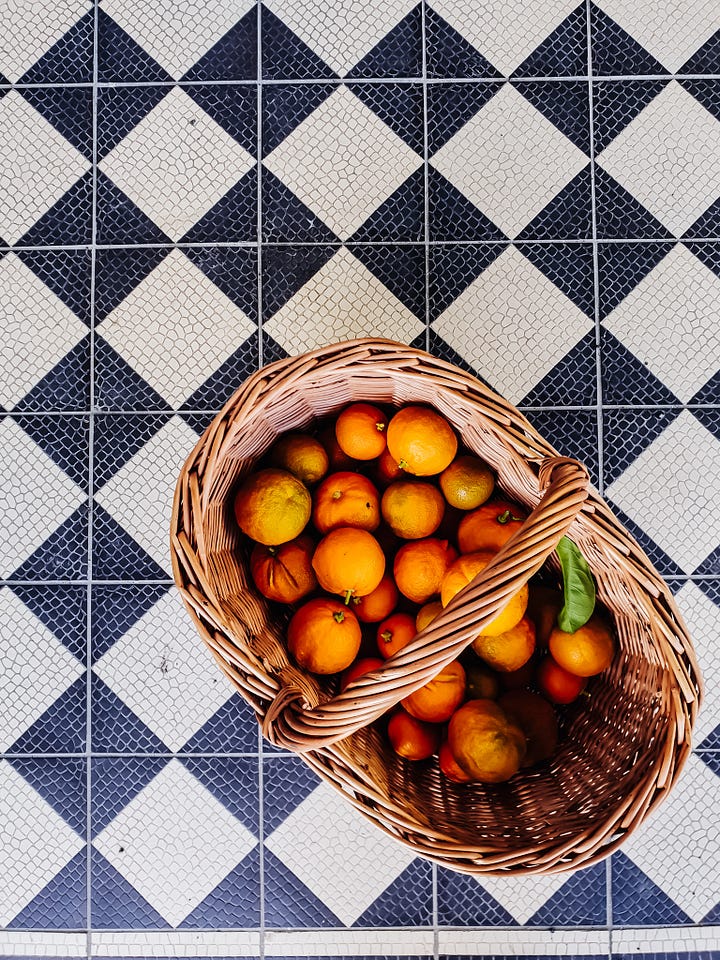
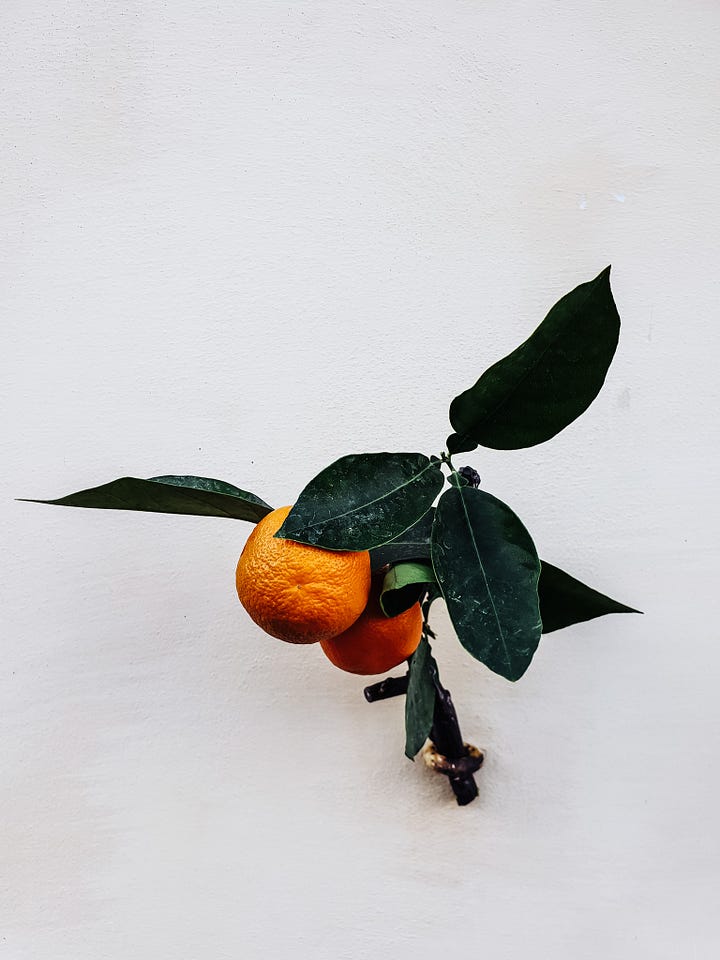
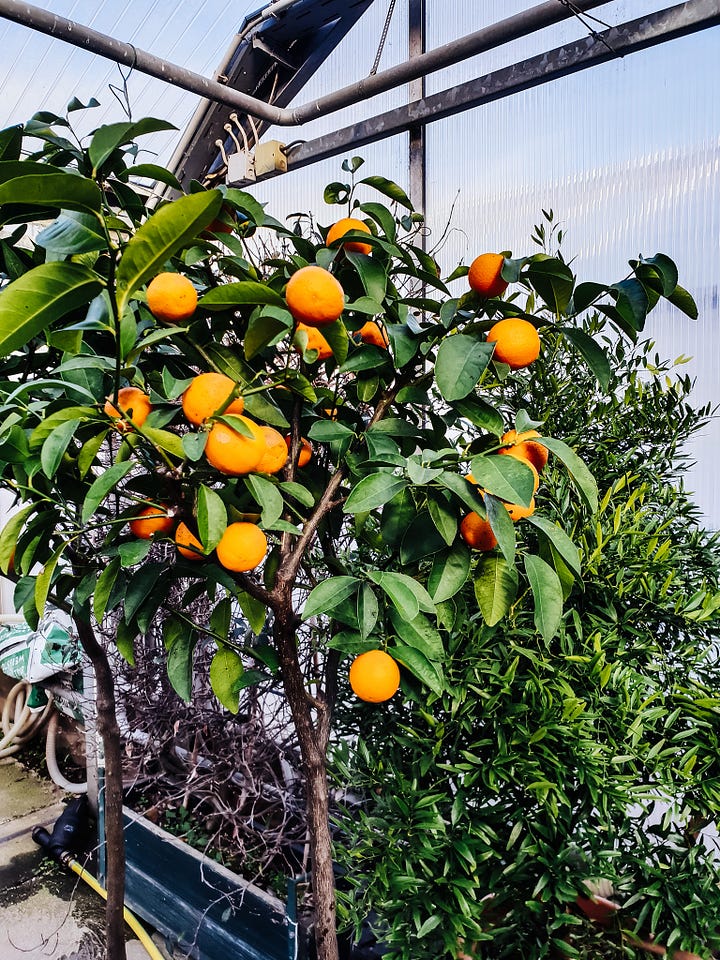
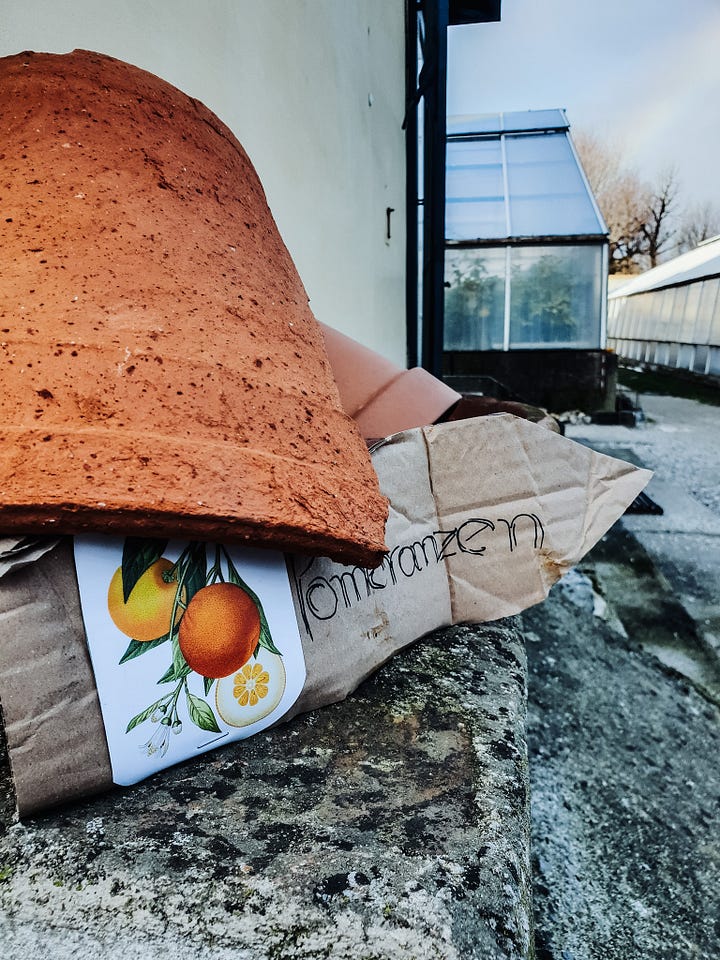
Another recipe that made last week particularly special included Katharina Seiser’s pomeranzenparfümierter Nougatgugelhupf. It has been a favourite in our home ever since Katharina introduced us to our first Schönbrunner Pomeranzen (bitter oranges) from the historic citrus trees there, some ten (?) years ago. My partner simply calls it “der beste Kuchen aller Zeiten”, and it truly is something special—especially because we only ever make it with bitter oranges, which are hard to come by. Last week, my friend Mara picked up some from Schönbrunn and generously shared them with me, which meant it was finally time to bake this fantastic cake again. If you ever get your hands on bitter oranges, I can also highly recommend Katharina’s recipe for bitter orange marmalade. I’ve made it a few times already, and this weekend, I’ll be making another batch.
On this month’s stack (reads, watches, & listens):
Slow Food Österreich on the Land schafft Leben Podcast
First things first: Christina Kottnig, head of Slow Food Österreich, recently gave a fantastic interview on the Land schafft Leben podcast—and it’s an absolute must-listen. Her energy is contagious, and her passion for Slow Food’s mission comes through in every word.
In the conversation with Hannes Royer, founder of Land schafft Leben and an organic farmer in Schladming, Christina dives into the evolution of Slow Food—both globally and in Austria. She also explains why organic certification is a non-negotiable standard for all producers under the Slow Food Österreich umbrella.
If you’re curious about the work Slow Food Österreich is doing or want to deepen your understanding of good, clean and fair food, this episode is well worth your time:
#222 Slow Food: gut, sauber und fair | Christina Kottnig mit Hannes Royer
“FOMO Sapiens – Verpassen wir die heile Welt?” by Valerie Huber
A compelling read that dissects modern anxieties—climate change, social injustice, and the fear of missing out on a better, more sustainable world. Valerie Huber offers sharp reflections for Millennials and Gen Z, questioning how we balance personal fulfillment with the weight of global crises.
“Denn genau um das Dazwischen geht es im Leben. Um die Dinge, die zwischen den Zeilen passieren, wenn wir abbiegen oder uns verlaufen.”
“Ist vielleicht Hedonismus vereint mit Solidarität und Humanität der Schlüssel zum Glück? Sich selbst möglichst viel Genuss zu ermöglichen und trotzdem empathisch und solidarisch seinen Mitmenschen gegenüber zu agieren?”
Bratislava City Guide from SOLO, Issue #13
Ever since I picked up copies of SOLO magazine in Valencia for our first Ferment Kiosk pop-up in 2021, I’ve been drawn to its perfect balance of coffee expertise, thoughtful reportage, and a touch of lifestyle. It’s a magazine that doesn’t just talk about coffee—it also explores the culture, people, and ideas surrounding it.
Issue #13 is no exception. One highlight is the Bratislava City Guide, and I’m already planning my next visit, eager to explore each recommended spot. Beyond that, the issue dives into a fascinating mix of topics: from the soul of specialty coffee and creating impact in the industry to repurposing coffee grounds. There’s even a section on cacao sips, blurring the line between coffee and chocolate culture.
(I picked up my copy at OTOTO 1070, and I’m excited that they’ll soon be opening a second location in 1020—bringing their selection of indie magazines even closer to me.)
“In Slovakia and the Czech Republic, people enjoy diversity and show a lot of curiosity about the novelties that roasters or baristas bring. This openness to experimentation is quite particular, especially compared to European countries with a strong coffee tradition like Italy or France, where espresso remains the preferred brewing method.”
“The blossoming of restaurants, cafés, bars, and bakeries makes Slovakia’s capital an extraordinary gastronomic and cultural destination.”
“Moral Ambition: Stop Wasting Your Talent and Start Making a Difference” by Rutger Bregman
A book recommendation by my friend Christine Friedreich. Rutger Bregman challenges conventional ideas of success, arguing that true achievement lies in using our skills to address pressing global issues. He introduces the idea of “moral ambition”—a drive to create meaningful change rather than accumulate personal accolades.
“Ein gewisses Maß an Selbstvertrauen ist wichtig, um aktiv zu werden: Man muss daran glauben, dass man etwas bewirken kann. In der Psychologie spricht man auch vom internal locus of control, also dem Gefühl, dass man die Kontrolle über sein Leben selbst in der Hand hat.”
“Moralische Ambition ist der Wille, die Welt drastisch zu verbessern.”
“Garden of Sorts” Magazine by Regina Idiartegaray
There’s something special about holding a new indie magazine in your hands, especially one that feels as carefully created as Garden of Sorts. This Vienna-based publication, founded by Regina Idiartegaray, explores the intersection of nature, culture, and humankind—offering a thoughtful, beautifully designed space for reflection on how we engage with the natural world.
I finally got my hands on a copy at HAFI Books, and the first issue is filled with a nice collection of stories. One that stood out is Yana Wernicke’s photo essay on fawn rescue—highlighting the staggering reality that, in Germany alone, around 100,000 baby deer are killed by mowing machines each year.
The issue also features an introduction to Miyawaki forests in conversation with Dr. Grey Coupland (Miyawaki forests are small, dense, and fast-growing forests created using a method developed by Japanese botanist Akira Miyawaki. The approach focuses on restoring native ecosystems by planting a diverse mix of indigenous tree species in a small area. These forests grow up to 10 times faster, are 30 times denser, and can absorb more carbon compared to conventional tree plantations), an exploration of urban wild plants by Jonas Frei (who also wrote the book Stadtwildpflanzen), and a beautifully crafted text and photo reportage on the spiritual and cultural significance of flowers in Hindu traditions, told through the example of the Bunga Padma, the lotus flower.
“Tending a garden will show you first hand how death is divine by design. If you keep a garden, you watch it die every year. You sit with it, you feel the cycle, you honor it, you mourn it and you collect seeds to keep the cycle of birth and death in flow.”
“To observe nature, we don’t need to fly around the world, we don’t need to watch the lions and zebras in the Serengeti, we can just open our eyes where we are. The stories about the flora and fauna of cities and villages are far more exciting than one might think.”
Eating out
Eating out over the past few weeks has been my way of satisfying wanderlust—one plate at a time. Luckily, Vienna offers plenty of opportunities to travel through food, bringing my favourite destinations closer without ever leaving the city.
Ihana
The charming Finnish café near Karmelitermarkt is my go-to for a Scandinavian escape. Hanna Yrjölä and her small but exceptional team create a warm, welcoming space with excellent home-baked goods (always, always leave room for their Korvapuusti) and smørrebrød. The experience is made even more special by the mix of vintage Arabia tableware and modern Iittala glass ware—Scandinavian design at its finest.
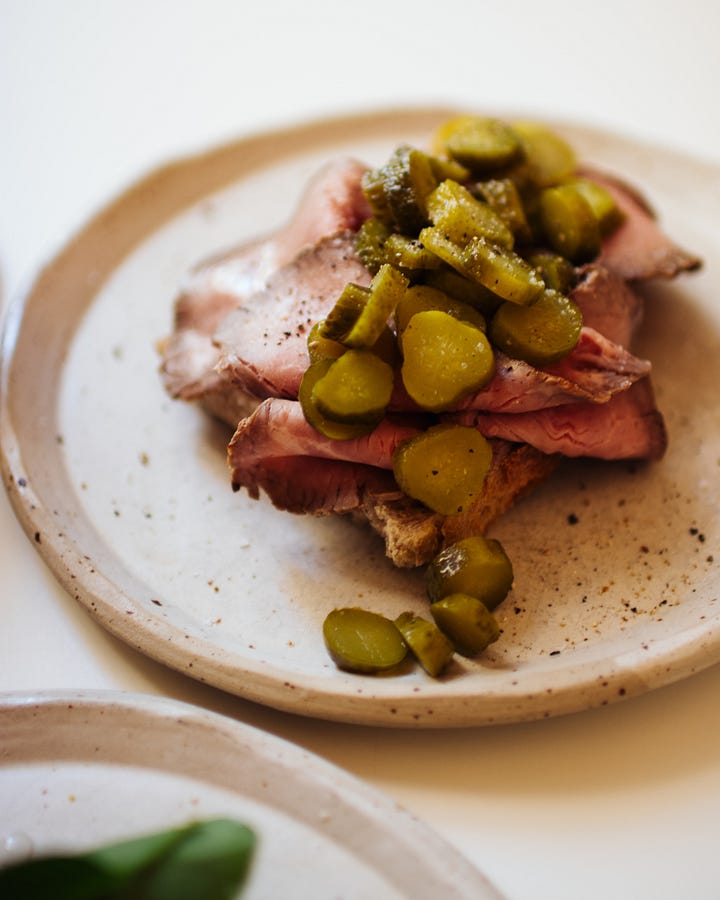
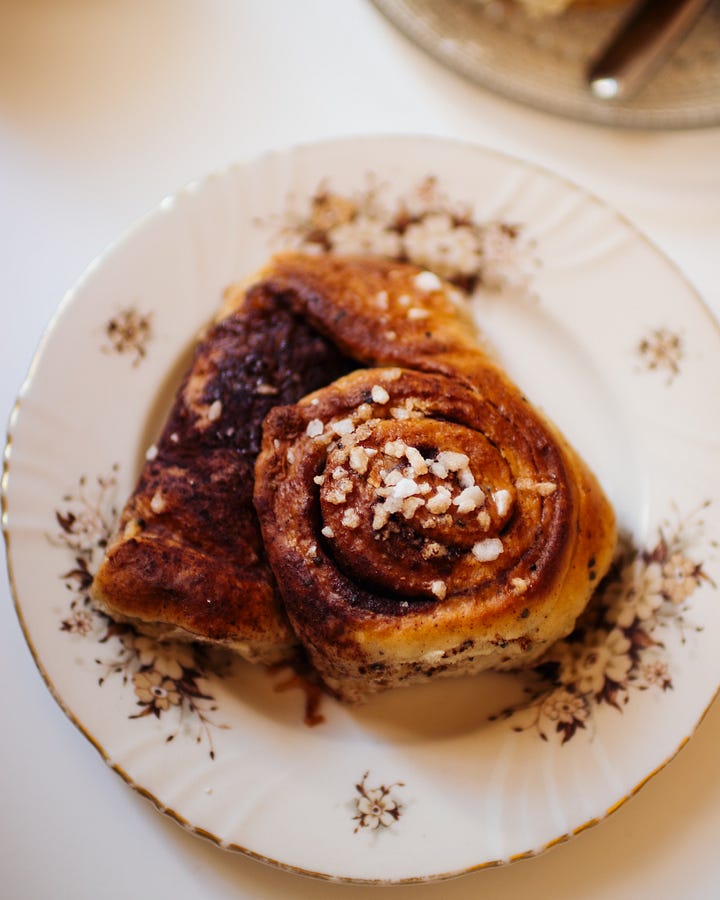
Beaulieu
Sometimes, only a French escape will do, and Beaulieu at Palais Ferstel never disappoints. This cozy restaurant embodies what I love most about French cuisine: a deep appreciation for quality produce and provenance. On our last visit, we enjoyed a wonderful organic Pet Nat, Moules à la Marinières and, of course, Wiener Weinbergschnecken from Andreas Gugumuck’s Wiener Schneckenmanufaktur.
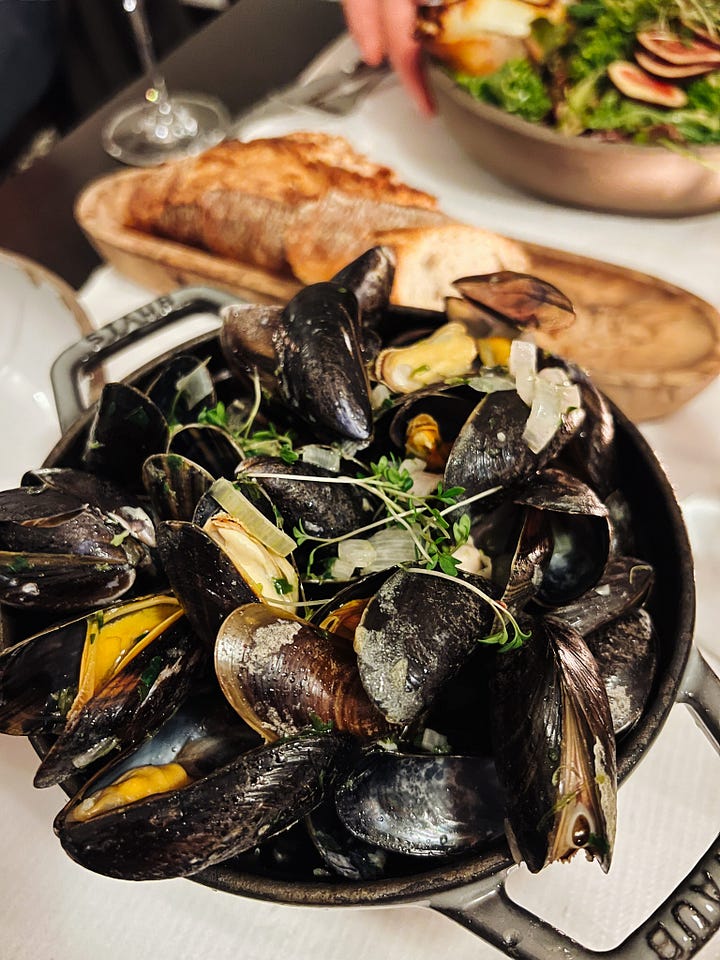
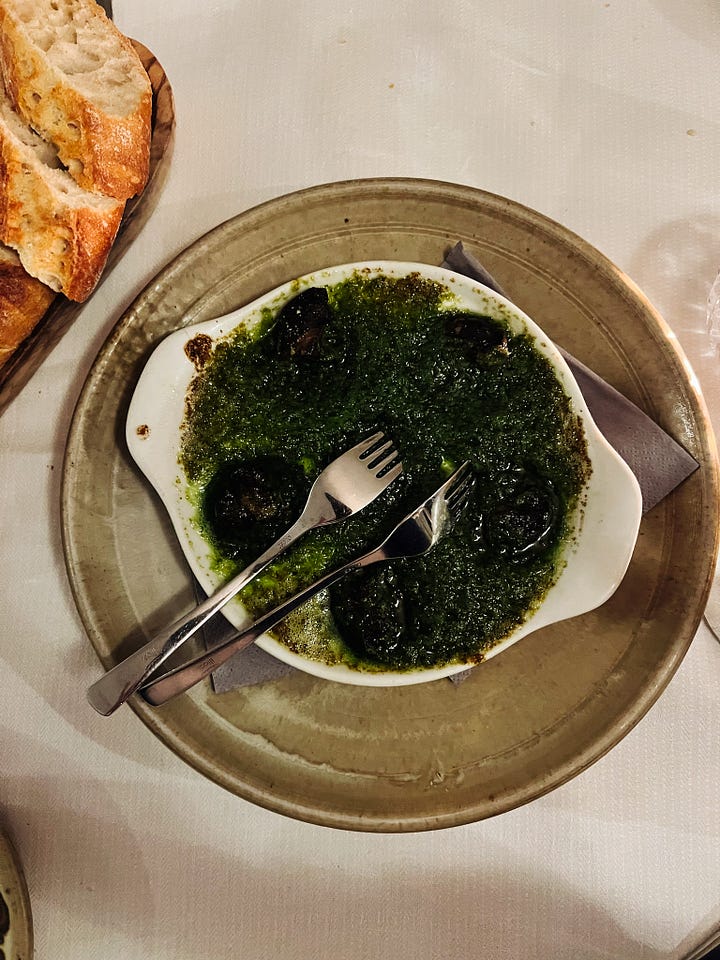
La Petite Crème de la Crème
It’s no secret—I have a soft spot for all things French. One of my favorite French pâtisseries in Vienna, Crème de la Crème, recently opened a second location in the 4th district—La Petite Crème de la Crème—, just as charming as their original in the 8th. It’s the perfect place for a little taste of Paris in Vienna. I’m always impressed by the attention to detail Julia Kilarski pours into not just her pâtisserie but also her cafés, creating spaces that feel as thoughtfully crafted as the pastries themselves.
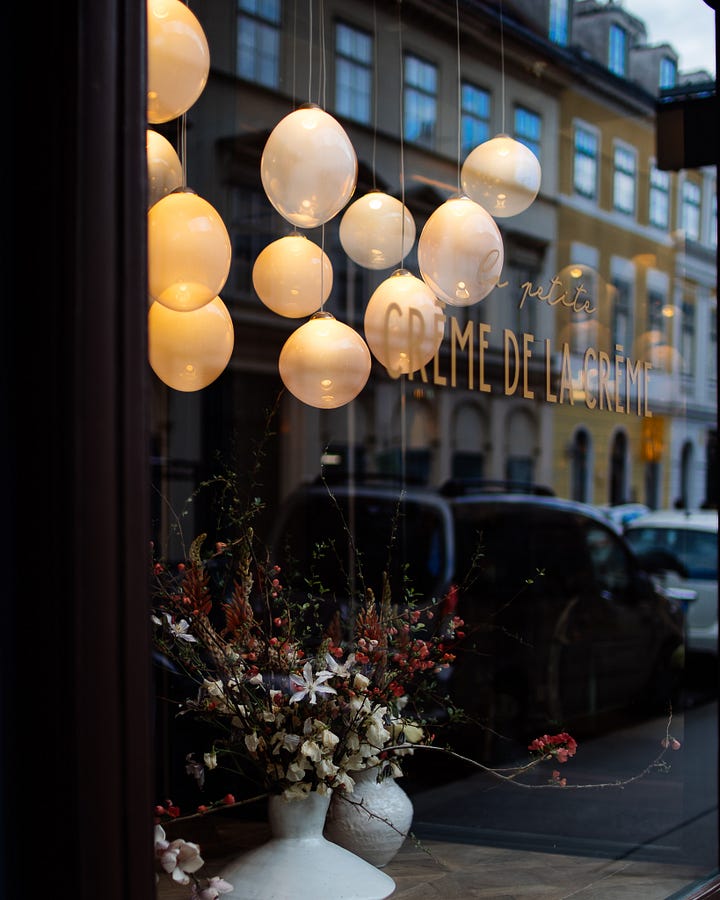
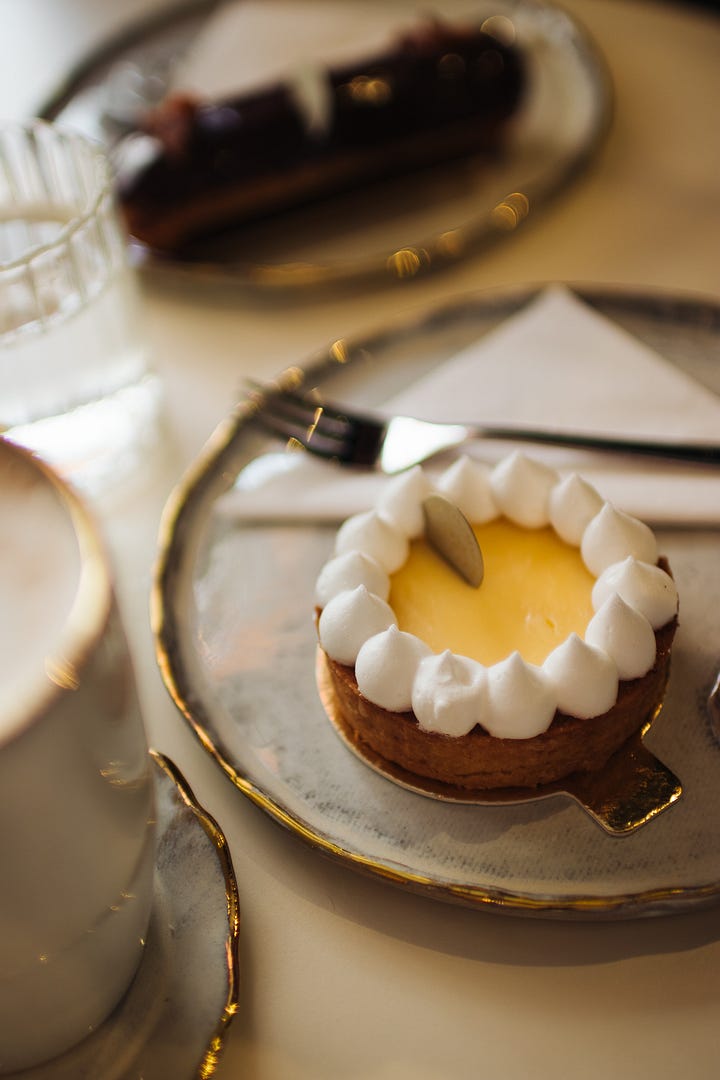
Food for Thought on Substack
Here, I’m sharing three Substack articles that caught my attention this month—thought-provoking reads that sparked ideas, challenged perspectives, or simply stayed with me for their beautiful writing:
“The Farm Diaries” by Julius Roberts
I was thrilled to see Julius Roberts launch “The Farm Diaries” on Substack. The farmer and restaurant-trained chef, Julius documents his self-sufficient life on the Dorset coast, growing ingredients with care and cooking with simplicity. His new publication will be part written journal, part audio and visual diary. At its core, “The Farm Diaries” offers a weekly seasonal recipe, focusing on simple, heartfelt cooking that anyone can replicate. A welcome addition to my reading list.
“Postest du noch oder schreibst du schon?” by Sarah Satt
My dear friend and colleague Sarah Satt wrote a thought-provoking piece exploring whether new writers should focus on building an Instagram community (first)—and where we actually discover new authors and their books. She weaves in different perspectives, including Emma Gannon, who has been openly skeptical about Instagram and even temporarily handed her account over to an assistant (though she is back now).
Sarah argues against one-size-fits-all advice, emphasizing the importance of cultivating and communicating your own unique perspective. I particularly liked her reference to Amy McNee’s strategy: “Being brilliant and waiting for people to notice.”
While Sarah’s piece focuses on writers, her insights undoubtedly resonate with all creatives, opening up an important conversation. At a time when social media often feels more like an obligation than a creative space, her reflections are, as always, refreshing.
“Der verrückte Mann und das Meer” by Tobias Müller
If you read Der Standard, you might be familiar with long-time writer Tobias Müller's food column Gruß aus der Küche (Tobias was also the founder of the much-missed Austrian indie food magazine All You Can Eat).
For 13 years, his column has explored food with depth and curiosity. Some time ago, he’s moved his newsletter to Substack, offering a look back at his archives—resurfacing recipes and essays from ten, eleven, or even twelve years ago. Some, he admits, he’d write differently today. But much of it remains timeless, a testament to good food writing.
Adding to a recent debate about sourcing produce for fine dining, Tobias Müller published “Der verrückte Mann und das Meer”, reflecting on a trip to Norway to meet seafood diver Roderick Sloan. Sloan, known for harvesting hand-dived Norwegian scallops, offers a fascinating perspective on what makes them so sought after. The essay explores their taste, provenance, and whether they truly live up to their legendary reputation.
From the desk of Studio Ferment
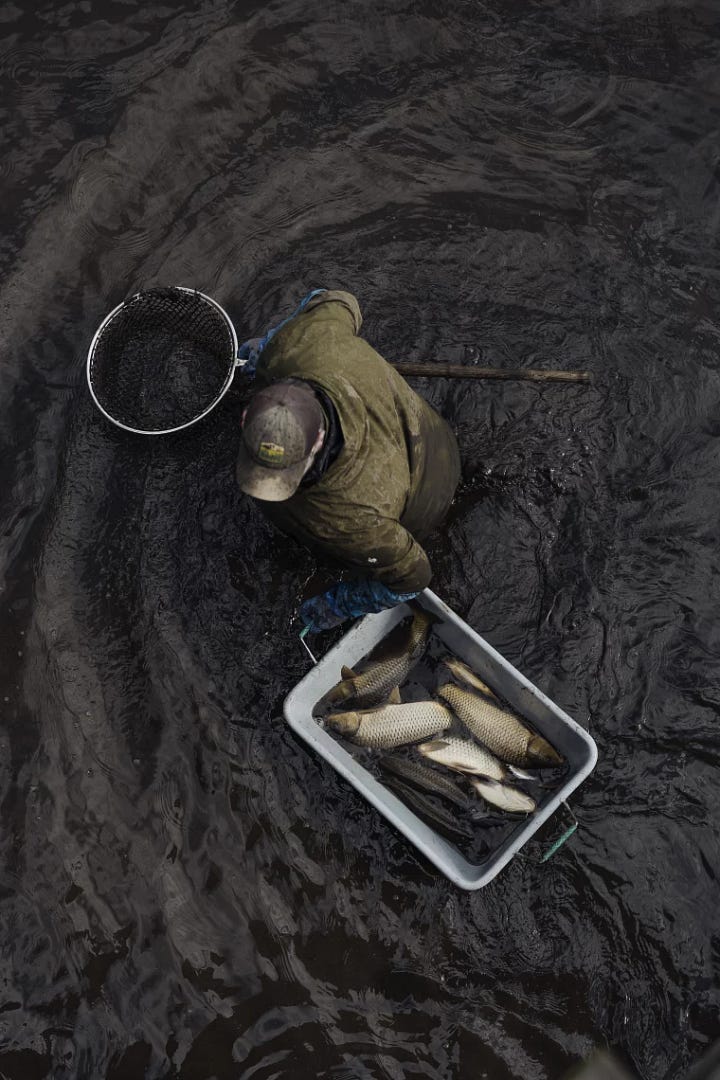
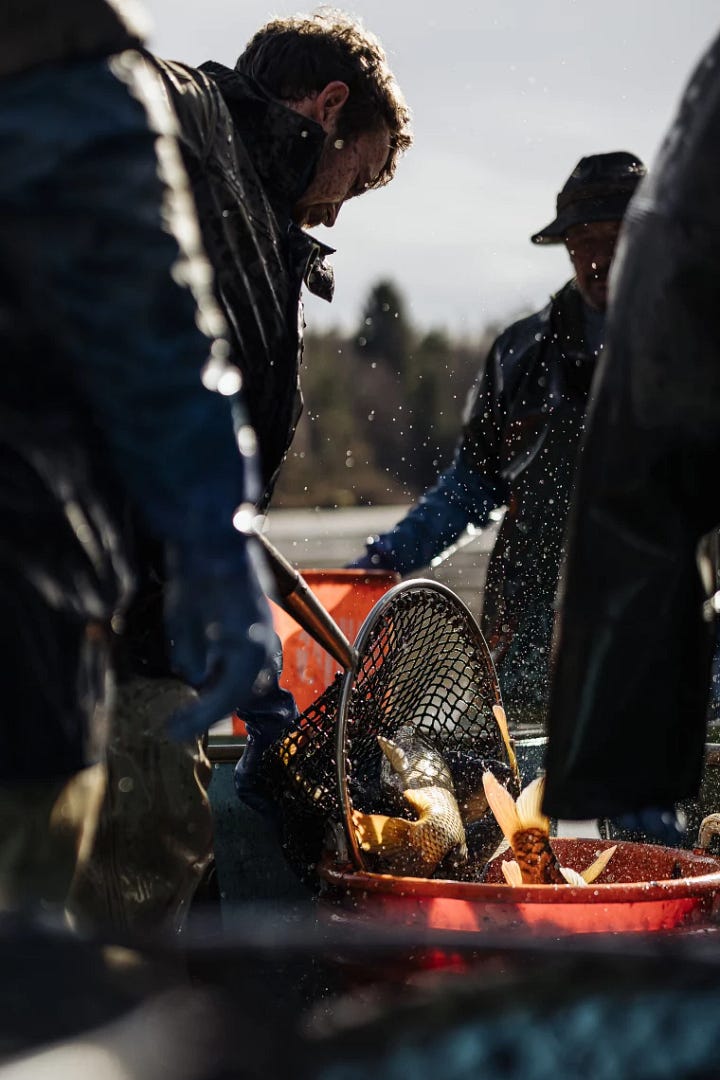
March marks the time of “Frühjahrs-Abfischen” in the Waldviertel region. Two years ago, photographer and dear colleague Mara Hohla and I had the chance to take part in this remarkable tradition at Schloss Litschau, documenting the experience for our client Niederösterreich Werbung.
It was unforgettable—watching the fishermen wade through the knee-deep waters of Schloss Litschau’s Richterteich, pulling their nets tighter and tighter until all the fish were gathered in the “Fischwasser”. The water churned, fish leapt, and we experienced what the people of Waldviertel call “Der Teich kocht” (“The pond is boiling”).
You can read my words about our experience on the website of Niederösterreich Werbung:
Wenn im Waldviertel der Teich kocht: Beim Abfischen auf Schloss Litschau
And if you’d like to witness this spectacle yourself, “Frühjahrs-Abfischen” at Schloss Litschau begins this Saturday, March 15th.












I absolutely love your post—it’s such a joy to discover you! And thank you for the recipe idea from Comfort—it truly feels like a perfect match for March i agree. Plenty came to mind also as a great spring cookbook with the beautiful asparagus recipes! And Vienna… such a special place. I’d love to go back soon—hopefully not just in my dreams!
Vielen Dank fürs Beitragteilen und für die schöne März-Inspiration!